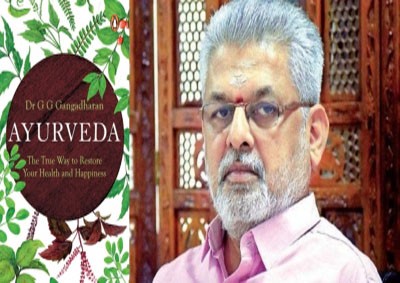
New Delhi, May 31 (IANS) Our bodies are intelligent systems designed to keep most diseases at bay, but we must pay more attention to the signals they give us. Listening to our bodies allows for true restoration through Ayurveda, which has so much to offer and its simple application can transform one's daily life, says Dr G.G. Gangadharan, who, for over three decades, has championed this sound, scientific framework of healthcare that has saved countless lives over 5,000 years.
"Ayurveda is a sound, scientific framework of healthcare that has saved countless lives over 5,000 years. It needs champions, and to be given wings in a world that needs Ayurveda more than ever," Gangadharan, the author of three research papers, twelve research articles, thirteen primary papers and six books, told IANS in an interview of his new book, "Ayurveda: The true way to restore your health and happiness" (Penguin).
"I am on a mission of spreading good Ayurveda all over India and the world. Towards this, I am training doctors and therapists and developing a team with administrative support to reach people who want to practice Ayurveda through institutional framework via franchise mode.
"I believe this is the best way to popularise Ayurveda in a sustainable and respectable way," Gangadharan added.
How did the book come about?
"It is the outcome of my experience in the field of Ayurveda for the last 35 years. I feel I have unique experience in the field of Ayurveda from three perspectives - clinical, research and field work.
"In the initial 10 years, I travelled in rural India and met many local health practitioners and recorded their practices. At the same time, I have been actively involved in clinical practice in well-established Ayurveda hospitals. I was also involved extensively in research, both clinical and basic principles of Ayurveda.
"I was active in research under the guidance of (cardiac surgeon and former President of the Indian National Science Academy) Prof M.S. Valiathan from 2008 to 2015. I was involved in research in Ayurveda biology, which involved major institutes like CCMB, Hyderabad, Manipal University, Banaras Hindu University and IISc, Bangalore, which came out with publications of 5-6 papers co-authored by me, including one published in "Nature" on genomics and dosha prakriti. I have tried to capture all these in the book," Gangadharan explained.
The outcome is a book that is all about how Ayurveda can keep one healthy and also explains various intricacies of Ayurveda for an inquisitive mind.
"I have picturised Vatha, Pitha and Kapha in a lucid form and explained how it interacts with body and mind in health and disease. I have been active in the voluntary sector as an activist and I was supported partially by Ashoka Foundation for Innovators for the Public. All these experiences drove me to write a book of this kind," Gangadharan, who has conducted training programmes in the US, the UK, Germany, France, China, South Africa, Kenya, Nepal, Italy and Hong Kong, in addition to India, elaborated.
During his career, he has collaborated with social organizations, corporate organizations, government think-tanks and international agencies that are interested in improving healthcare.
Given the raging Covid-19 pandemic, what are his everyday tips to lead a safer life?
"During the pandemic or otherwise, Ayurveda gives a definite plan for daily life and seasonal routines to be in perfect health. I have elucidated tips like getting up early in the morning after sound sleep, when previously eaten food is completely digested, is a first step for good health. Evacuation of bowel, cleaning oral cavity, exercise/walking, and having a bath.
"Eating the right food at the right time; food should be with all the six tastes, should be unctuous and easily digestible. Fruits and vegetables are of special value. Eating lunch with a teaspoon of warm ghee with locally available vegetables and traditional recipes is the best thing," he said, adding: Evenings are meant for soup and juices; one should have light food at night and go to bed early.
"Keep mind in tranquility. This can happen only through effort and proper guidance," Gangadharan concluded.


.jpeg)

